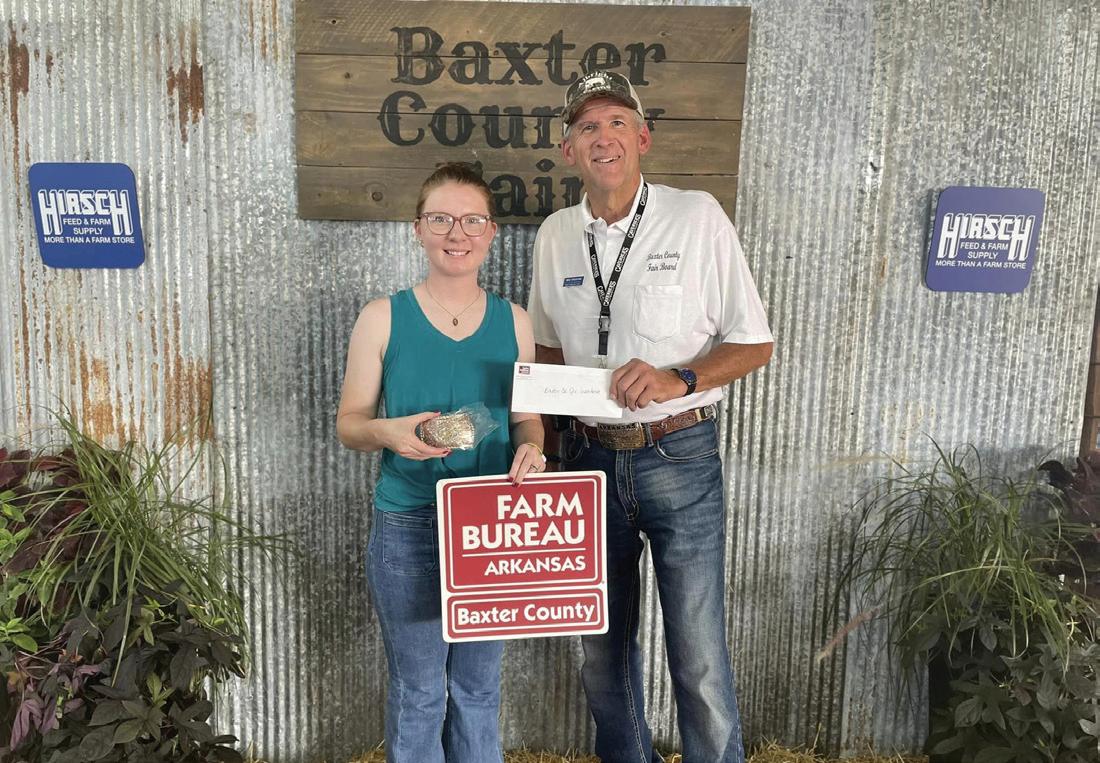Farm Bureau Press



Arkansas Farm Bureau is seeking nominations for the Stanley E. Reed Leadership Award. This award honors a Farm Bureau leader who exhibits the tenants of thoughtful leadership. Nominations deadline is Nov. 15.
The Stanley E. Reed Leadership Award honors a Farm Bureau board member, who is between the ages of 36-45, for their outstanding leadership within their county Farm Bureau and their community.

With the assistance of your county Farm Bureau, we would like to identify appropriate individuals to be considered for this recognition. Please consider nominating the best and most impactful young farm leaders in your county to be considered for this prestigious award. A nomination form is available on the Farm Bureau intranet, under Organization and Member Programs-Board Forms.
Stanley E. Reed, who served as president of Arkansas Farm Bureau from 20032008, was taken from us far too early. He left a legacy of wisdom, integrity and commitment that will stand with this organization for generations to come. Both the state and national Farm Bureaus were shaped by his involvement in our organization.
The 2024 recipient will be named at the 90th Annual Convention of the Arkansas
in

Ag in the Columbia County Classroom | Columbia County Farm Bureau board member Lindsey Holtzclaw recently brought Ag in the Classroom to life, visiting a local classroom and teaching young children about the vital role bees play in agriculture! She read a fun book about honeybees, let students sample honey, showed off her beekeeping gear and did a hands-on pollination activity using Cheeto dust! To cap the day, students enjoyed a bee-themed snack.


Baxter County Fair | Baxter County Farm Bureau wrapped up the 2024 county fair by sponsoring 20 belt buckles for winners, donating more than $1,300 in premium money and providing 140 fair shirts for exhibitors.
The five-year 2018 Farm Bill expired at midnight on Sept. 30 after a one-year extension passed by Congress in 2023. Several programs that depend on farm bill authority to operate immediately, including international trade programs like the Market Access, Foreign Market Development, and Food for Progress programs, Specialty Crops Block Grants, animal health programs and several others. The Dairy Margin program will expire at the end of the calendar year without Congressional action and revert to permanent law from the 1940s which requires the federal government to support milk at parity price. Both Price Loss Coverage (PLC) and Agriculture Rick Coverage (ARC) for the 2024 crop were authorized under the one-year extension, and therefore those programs remain in effect, with payments, if triggered, due to farmers in October 2025. If no farm bill were passed for the 2025 crop, some crops would revert to parity price support accomplished by large government purchases and nonrecourse loans, while other crops would have no support at all. Crop insurance and nutrition programs are permanently authorized and therefore will continue to be funded.
ArFB continues to urge our Congressional delegation to act now to provide desperately needed relief to the agriculture industry before it is too late. Farmers need a strong safety net that provides certainty to obtain operating loans for the 2025 crop, and emergency economic assistance now to help them survive the 2024 crop with an outdated farm bill. AFBF and all 51 state Farm Bureaus sent a letter to Congress urging the passage of a new farm bill and a supplemental economic disaster program to bridge the gap between now and when a new farm bill would take effect. Sen.p John Boozman has recently spoken about the need for action on the Senate floor, and the Arkansas House delegation sent a “Dear Colleague” letter to other members of the House requesting swift action as well. Unfortunately, they are not scheduled to be back in session until Nov. 12, although they could return to Washington sooner in the wake of Hurricane Helene and the desperate need for aid in the affected areas.
Arkansas has a desperate shortage of skilled labor — electricians, welders, mechanics, truck drivers, plumbers, HVAC technicians, etc. These shortages are especially impactful to Arkansas farmers and ranchers and our rural communities.
Issue 1 is your chance to invest in Arkansas’ future by expanding opportunities for students pursuing vocational and technical education. By allowing lottery proceeds to fund scholarships and grants for vocationaltechnical schools and technical institutes, we can build a stronger Arkansas workforce that supports rural Arkansas communities.
Issue 1 fills critical gaps in industries that keep our economy strong. Whether it’s a high school graduate seeking career training or an adult looking to reskill for a better future, Issue 1 provides the financial support they need to succeed.
Vote yes on Issue 1 and invest in the future of our communities, our workforce and our state.
Important 2024 election dates to keep in mind include:
• Oct. 7 – Deadline to register to vote in the general election
• Oct. 21 – Early voting begins for the general election and nonpartisan judicial runoff election
• Nov. 5 – Election Day
To receive instant ArFB updates, including legislative updates, action items, news alerts and farm program information, text ARFB to 52886.



Congratulations to Scott County Farm Bureau on being the first county to reach membership quota in 2024 and has qualified as Honor County No. 1!
Congratulations to the Scott County membership chairman, board of directors, employees and all members on a job well done.
The membership year runs through Oct. 31.
The Arkansas Agriculture Hall of Fame is seeking nominations from the public for its next class of inductees. The nomination deadline is Nov. 1.
The Agriculture Hall of Fame recognizes Arkansans who have contributed significantly to the state’s largest industry while spotlighting their contributions to the state’s economic development. Since its first class was selected in 1987, a total of 192 men and women have been inducted.
Debbie Moreland, chairman of the Arkansas Agriculture Hall of Fame, says anyone can nominate a person believed worthy of the honor.
The nomination form is available online. Forms can also be requested by calling 501-228-1609.
The nomination form provides space to provide the principal justification for a candidate’s nomination, a summary of the nominee’s contributions to agriculture and their community, a record of their professional experiences and their involvement in public service and support of agriculture.
The induction ceremony for the next class of honorees will be held March 28 at the Statehouse Convention Center in Little Rock.
as of October 2, 2024
Contact Brandy Carroll brandy.carroll@arfb.com
Tyler Oxner tyler.oxner@arfb.com
Despite recent weather delays, rice harvest remains well ahead of the usual pace. USDA says Arkansas farmers have harvested 85% of the crop, compared with a five-year average of 69%. Nationally, 78% of the crop is in the bins, compared with a five-year average of 67%. Harvest pressure has begun to ease, and weekly export sales have generally been supportive. The recent interest rate cut and other economic factors have resulted in declines in the value of the dollar, making U.S. commodities more affordable. The threat of expanding war in the Middle East and the continued war in Ukraine pose a threat to food safety that is potentially global in scale, and that could support the rice market. India has announced that they have lifted a ban on exporting non-basmati white rice, which has been in place since July 2023. Global prices have already begun a decline as the market adjusts to the release of India’s stocks. Technically, November futures have an upside objective near $15.60. A close above that resistance would open the possibility of a retest of resistance at the contract high of $15.86.
The cotton market appears to have confirmed a bottom at the low near 66 cents and posted solid gains during September. December futures have been chopping along in a mostly sideways pattern in
recent days, however, unable to close above resistance at 74 cents. The harvest is underway and ahead of the usual pace. Arkansas farmers have picked 21% of the crop, ahead of the five-year average of 11%. While Hurricane Helene caused catastrophic damage, the cotton crop was not as affected as it was feared. 31% of the crop was rated good to excellent, down from 37% in the previous report as the Georgia crop suffered some damage. Some additional quality losses could also result with so many open bolls in the field. Exports have been disappointing, despite losses in the value of the dollar.
The corn harvest was reported as 21% complete as of Sunday, September 29. Early yield reports are strong, and 64% of the remaining crop is in good to excellent condition according to USDA. 24% is in fair condition and only 12% is in poor to very poor condition. December futures appear to have charted a double bottom at $3.85 in late August. The next upside objective is $4.41, the top of a huge bearish reversal charted in June. The lower prices have resulted in more domestic and export purchases, helping the market to build upward momentum. The market received some relatively bullish news from the recent Sept. 1 stocks report. While stocks are still up 29.1% from the previous year, the total corn stocks estimate of 1.760 billion bushels was near the low end of trade expectations.
Soybean futures are attempting to confirm a bottom. November beans have support at a double bottom of $9.55 but have stalled out at resistance near $10.80 for the time being. The lower prices have led to strong demand, and that
is providing some support. 26% of the crop nationwide has been harvested, compared with a fiveyear average of 18%. In Arkansas, 47% of the crop is in the bins, compared with the usual pace of 29%. Significant rainfall totals from Hurricane Helene through parts of the south and Mid-West will certainly slow harvest. The Sept. 1 Quarterly Stocks Report pegged soybean stocks up 48.1% from the previous year, which could limit the upside potential for prices.
Live cattle futures continue to rebound after recent losses. However, seasonal weakness in wholesale beef prices and negative packer operating margins could limit the upside. October futures have tough resistance at $188, and February has resistance at $189. The relatively tight supply of fed cattle will be supportive. However, supplies do usually increase in the fall due to seasonal factors. Current cash market prices have been stronger than anticipated. Feeder cattle futures are following live cattle prices higher, despite higher corn prices.
Lean hog futures have renewed a upward movement after a few days of weakness. The December contract is in position to challenge resistance near $77. The quarterly inventory report was mostly as expected, with the total inventory 100.5% of the previous year. However, the inventory of hogs weighing over 180 lbs came in above expectations and suggests that in the short-term we could see increases in marketings.